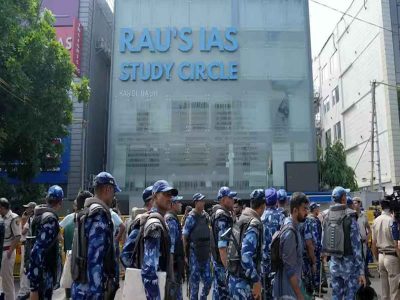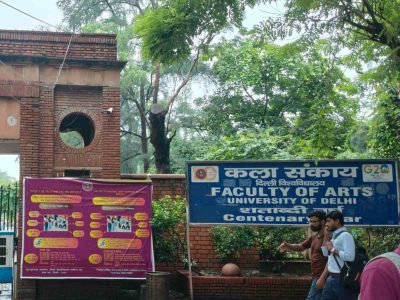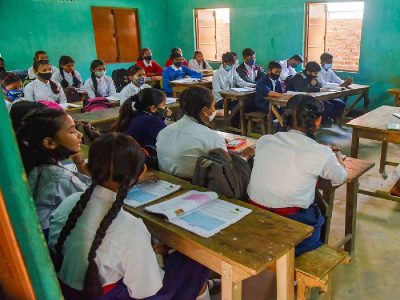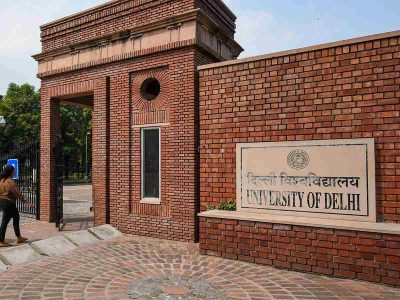Even after shutting down basement activities in Old Rajinder Nagar’s coaching institutes, the authorities’ promises to improve living conditions for UPSC aspirants remain largely unfulfilled. Students claim that despite their protests following the tragic deaths of three aspirants, they are still compelled to endure substandard conditions and skyrocketing rents while pursuing their dreams in Delhi.
Aspirants allege that their demands, ranging from affordable housing to better amenities, have been ignored by the authorities. Meanwhile, brokers and landlords continue to exploit students, who often come from middle-class families with limited financial resources.
Patriot visited Old Rajinder Nagar to investigate the situation and assess whether the authorities have delivered on their promises.
Deserted basements but no relief
The iconic Rau’s Study Circle, sealed by authorities after the crackdown, now stands deserted. Other nearby coaching centres have shifted their operations to the main road near Karol Bagh metro station. While basement operations have ceased, aspirants say this move has done little to improve their overall situation.
“Nothing concrete has been done for the students who come here with big dreams,” said an aspirant. “The issues we raised during the protests—like unaffordable rents and subpar living conditions—are still unresolved.”
Unfulfilled promises
On August 1, Delhi’s Lieutenant Governor Vinai Kumar Saxena, after meeting with student representatives, directed Delhi Police Commissioner Sanjay Arora to take immediate action against exorbitant rents and cash-only transactions. However, students report that little has changed since the announcement.
Also Read: Delhi government yet to learn from the coaching centre incident that left 3 dead
“We are still paying high rents and dealing with unresponsive landlords and brokers,” said a student. “There is no practical solution in sight.”
Steep rise in library charges
Students also raised concerns over a sharp increase in library fees after coaching institutes moved their facilities from basements to higher floors.
“The charges have doubled,” said an aspirant who did not wish to be named. “For example, the monthly library fee was Rs. 2,000 earlier, but now it’s Rs. 4,000. This has increased our financial burden significantly.”
Coaching institutes, including Vijeta IAS Academy, declined to comment on the matter when approached by Patriot.
Skyrocketing rents for cramped spaces
Living in Old Rajinder Nagar comes at a steep cost, students say.
“I pay Rs. 20,000 for a triple-sharing room in a PG,” said Deepti Kushwaha, an aspirant from Bihar. “The room is tiny and has no ventilation. I’ve been here for 10 months, but I haven’t even met the owner. Everything goes through the broker.”
Kartik Gaurav, a student at Vijeta IAS Academy, added, “I pay Rs. 16,000 for a double-sharing room. It’s so small that after placing two single beds, there’s no space to move. The ventilation is minimal, with only a small window that we rarely open.”
Meenakshi, another aspirant from Hyderabad, shared, “I’ve been living here for four years, and the conditions are awful. I pay Rs. 18,000 for a double-sharing room without food or electricity. In Satya Niketan, I paid Rs.16,000 for better accommodation that included amenities. Here, everything feels overpriced.”
Property owner-broker nexus
Students claim that a nexus between property owners and brokers drives up rents, forcing aspirants to spend much more than they can afford.
“It’s impossible to rent a room directly from the owner,” said Vinoy Kumar, a student from Hyderabad. “You have to go through brokers, who charge anywhere from 60% to 100% of the total rent as a brokerage fee. This nexus is exploiting students who come here with limited means.”
High electricity and water charges
Electricity costs in Old Rajinder Nagar remain a significant burden, despite Delhi’s provision of 200 units of free electricity.
“We are charged Rs. 9–14 per unit by brokers. They treat students as opportunities to make money,” said Sita, an aspirant from Andhra Pradesh. “In Old Rajinder Nagar, it feels like you even have to pay for sunlight. That’s how costly this area is.”
Water charges also add to the financial strain, with students forced to pay Rs 500 per month despite water being free in Delhi.
Also Read: Delhi coaching centre deaths: UPSC aspirants sent two complaints before the incident, to no avail
“My PG owner made it a mandatory term before renting the room,” said Nausheen Khan, a student living in Old Rajinder Nagar. “Everyone is paying these charges, and it’s completely unfair.”
A tragedy that sparked protests
The dire conditions in Old Rajinder Nagar came to national attention on July 27, when heavy rains flooded the basement of Rau’s Study Circle, claiming the lives of three IAS aspirants: Shreya Yadav from Uttar Pradesh, Tanya Soni from Telangana, and Nevin Dalwin from Kerala.

The incident sparked widespread protests across the city, with students demanding better safety regulations, compensation, and improved living conditions.
Other major developments in 2024
In another significant event in the education sector, the Delhi University Students Union (DUSU) election results were announced on November 25 after a two-month delay.
The Congress-backed National Students’ Union of India (NSUI) secured the president and joint secretary posts for the first time in seven years, while the Akhil Bharatiya Vidyarthi Parishad (ABVP) retained the vice president and secretary positions.





